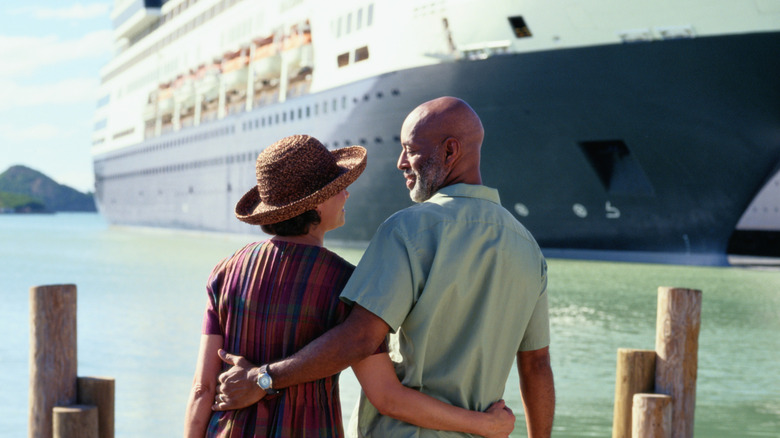The Most Common Scams You're Likely To Encounter While On A Cruise
Cruises are unmatched in offering an easy switch into vacation mode, where you can kick up your feet and relax far from your worries hundreds of miles out at sea. That being said, you shouldn't completely drop your guard as you may be a prime target for an overpriced item or a scam on your vacation. On board, art dealers, duty-free shops, luxury stores, and the spa may try to use various sales tactics to make a quick sale from an unsuspecting tourist. These are not outright scams, as they don't aim to (according to the official definition), "deceive and defraud," but they will likely leave a cruiser with a deep sense of buyer's remorse if they realize they've overpaid.
Behavioral science can give us a better idea of how the human brain works when making decisions. According to Dr. Daniel Kahneman, author of the groundbreaking book "Thinking, Fast and Slow," the human brain has two systems for thinking. System 1 is quick and largely based on decision-making through patterns and experiences, while System 2 is much slower and requires effort by using critical thinking. Since System 1 is the dominant system used by our brains to make everyday decisions, we normally default to using System 1 whenever possible, whether we are interviewing someone who looks like us, or taking something when it appears to be a gift. These tactics and a polite tourist in vacation mode make a perfect recipe for a target.
Stores and advertisements combine massive discounts with pricing tactics to persuade buyers to make a purchase. Since we've been trained to recognize that 70% off is a great deal and love the emotional high that comes along with it, we're easy prey for smooth salespeople or the peddler selling high-quality fake Ray-Bans for a few bucks.
Common scams at ports of call
Ahh, land! After a few days at sea, you're finally in Cozumel, Barcelona, Livorno, or Aruba and are excited to get out and explore for a few hours. As you make your way through the port, you may encounter friendly locals ready to sell their wares or offer their services. They may offer photos with exotic animals, transportation, private shore excursions, or propose to be your tour guide and show you around the area for a few hours, but note that they've had thousands of chances to master their pitch based on who they are targeting.
Private or third-party shore excursions can be a highlight of your trip if you know what you are booking. However, they can be a disaster waiting to happen if you haven't done your research. If you disembark without a plan of action, you could be an easy target for a scammer selling day tours or providing transportation around town. A common scam is for tourists to purchase a day trip and be taken to souvenir shops or tourist traps where they'll encounter non-stop aggressive sales tactics until they make a purchase, or for the driver to demand payment again or additional payment at the end with the help of his burly friends.
A more sophisticated scam at ports of call involves providing an unsuspecting tourist a free drink, treatment, or free bracelet. Once the tourist accepts the item, they will hear a sales pitch for a club membership, a skincare package, or a more expensive piece of jewelry. Once they've set the hook with the freebie, the sellers are aiming to create a feeling of reciprocity where you'll buy their product. The sellers or shops may also try to lubricate the deal with alcohol.
Protect yourself from scams on cruises
With many more first-time cruisers coming on board over the next few years, cruises and cruisers may become bigger targets for scam artists. However, many basic travel precautions and tips can make both experienced and novice explorers feel much safer when traveling abroad. On board, one of the biggest ways to protect yourself from inflated prices is by packing perfectly for your cruise.
Once you've booked your trip, be sure to do your research and check prices before you set sail. If you're considering buying something such as precious gems, jewelry, a watch, or even a conch shell, note that you will likely not be able to return the item for a refund. If you're out walking around in ports such as Nassau, Cozumel, and Aruba look out for a Starbucks or reputable location with free WiFi to check prices and reviews of local tour companies, download offline maps, or do some last-minute destination research before you set foot on your port adventure.
When you're spending a day on shore, take only the essentials that you'll need for the day. That means leaving large amounts of money, credit cards, and debit cards behind or splitting them on your person so you have less hassle in case you're pickpocketed. If you'll be visiting crowded areas, consider bringing a money belt to protect and hide your valuables from would-be thieves. Last but not least, use and trust your instincts. If the cruise pulls up to an industrial or rough-looking port, or if you've already crossed a destination off your list, a day onboard during a port day will mean fewer people at the pool and the buffet and more space to relax and enjoy your trip. And, you won't have to worry about losing your wallet.


